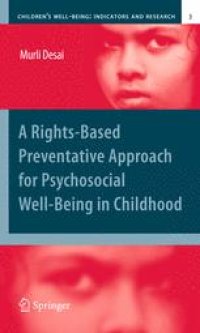
Ebook: A Rights-Based Preventative Approach for Psychosocial Well-Being in Childhood
Author: Murli Desai (auth.)
- Tags: Quality of Life Research, Developmental Psychology, Social Work, Educational Psychology
- Series: Children¿s Well-Being: Indicators and Research
- Year: 2010
- Publisher: Springer Netherlands
- Edition: 1
- Language: English
- pdf
Childhood is the most important stage of human development, a fact that makes children the central target group for social work intervention. In turn, most schools of human development and social work around the world have an elective course on children, with some offering a concentration in this area. Yet while there are plenty of textbooks on intervention with children that contain useful theories and skills, many focus on remedial rather than preventative strategies, and do not adopt a child rights perspective. In turn, books on child rights fail to link the latter either with theoretical background or the preventative approach. This book, aimed at faculty members and students in social work and related programs, breaks new ground by being the first to apply the child rights perspective and the preventative approach to intervention for children's psychosocial well-being. It covers crucial ground in child psychology, even providing an ecological perspective to potential developmental problems. Relevant to situations across the world, and integrating theory, practice and teaching, its three sections introduce the rights-based perspective to preventative intervention, then move on to examine primary, secondary and tertiary prevention for children’s psychosocial well-being.
Childhood is the most important stage of human development, a fact that makes children the central target group for social work intervention. In turn, most schools of human development and social work around the world have an elective course on children, with some offering a concentration in this area. Yet while there are plenty of textbooks on intervention with children that contain useful theories and skills, many focus on remedial rather than preventative strategies, and do not adopt a child rights perspective. In turn, books on child rights fail to link the latter either with theoretical background or the preventative approach. This book, aimed at faculty members and students in social work and related programs, breaks new ground by being the first to apply the child rights perspective and the preventative approach to intervention for children's psychosocial well-being. It covers crucial ground in child psychology, even providing an ecological perspective to potential developmental problems. Relevant to situations across the world, and integrating theory, practice and teaching, its three sections introduce the rights-based perspective to preventative intervention, then move on to examine primary, secondary and tertiary prevention for children’s psychosocial well-being.
Childhood is the most important stage of human development, a fact that makes children the central target group for social work intervention. In turn, most schools of human development and social work around the world have an elective course on children, with some offering a concentration in this area. Yet while there are plenty of textbooks on intervention with children that contain useful theories and skills, many focus on remedial rather than preventative strategies, and do not adopt a child rights perspective. In turn, books on child rights fail to link the latter either with theoretical background or the preventative approach. This book, aimed at faculty members and students in social work and related programs, breaks new ground by being the first to apply the child rights perspective and the preventative approach to intervention for children's psychosocial well-being. It covers crucial ground in child psychology, even providing an ecological perspective to potential developmental problems. Relevant to situations across the world, and integrating theory, practice and teaching, its three sections introduce the rights-based perspective to preventative intervention, then move on to examine primary, secondary and tertiary prevention for children’s psychosocial well-being.
Content:
Front Matter....Pages i-xxiii
Front Matter....Pages 1-2
Theories of Child Development and Vulnerability in Childhood....Pages 3-28
The Child Rights Perspective....Pages 29-46
A Conceptual Framework for Rights-Based Preventative Approach for Psychosocial Well-Being in Childhood....Pages 47-69
Front Matter....Pages 71-77
Methodology of Psycho-educational Group Work....Pages 79-99
Enrichment of Self-Awareness....Pages 101-115
Enrichment of Proactive Thinking Skills....Pages 117-136
Enrichment of Emotional Intelligence....Pages 137-154
Enrichment of Interpersonal Relationship Skills....Pages 155-170
Enrichment of Interpersonal Communication Skills....Pages 171-187
Family Life Education....Pages 189-209
Parenting Education....Pages 211-225
Front Matter....Pages 227-232
Process of Casework with Children and Their Families....Pages 233-257
Case Management with Children and Their Families....Pages 259-277
Children at Risk of Neglect and Secondary Prevention....Pages 279-293
Children in Emergency Situations and Secondary Prevention....Pages 295-308
Systems for Tertiary Prevention for Children....Pages 309-336
Abuse in Childhood and Tertiary Prevention....Pages 337-358
Commercial Exploitation in Childhood and Tertiary Prevention....Pages 359-379
Conflict with Law in Childhood and Tertiary Prevention....Pages 381-394
Back Matter....Pages 395-401